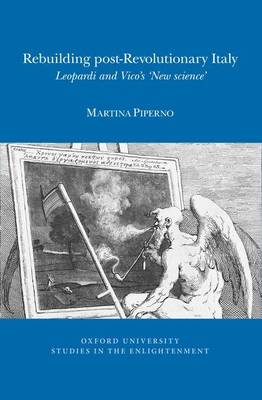
- Afhalen na 1 uur in een winkel met voorraad
- Gratis thuislevering in België vanaf € 30
- Ruim aanbod met 7 miljoen producten
- Afhalen na 1 uur in een winkel met voorraad
- Gratis thuislevering in België vanaf € 30
- Ruim aanbod met 7 miljoen producten
Zoeken
€ 85,00
+ 170 punten
Omschrijving
The rediscovery of the thought of Giambattista Vico (1668-1774) - especially his New science - is a post-Revolutionary phenomenon. Stressing the elements that keep society together by promoting a sense of belonging, Vico's philosophy helped shape a new Italian identity and intellectual class. Poet and philosopher Giacomo Leopardi (1798-1837) responded perceptively to the spreading and manipulation of Vico's ideas, but to what extent can he be considered Vico's heir? Through examining the reasons behind the success of the New science in early nineteenth-century Italy, Martina Piperno uncovers the cultural trends, debates, and obsessions fostered by Vico's work. She reconstructs the penetration of Vico-related discourses in circles and environments frequented by Leopardi, and establishes and analyses a latent Vico-Leopardi relationship. Her highly original reading sees Leopardi reacting to the tensions of his time, receiving Vico's message indirectly without a need to draw directly from the source. By exploring the oblique influence of Vico's thought on Leopardi, Martina Piperno highlights the unique character of Italian modernity and its tendency to renegotiate tradition and innovation, past and future.
Specificaties
Betrokkenen
- Auteur(s):
- Uitgeverij:
Inhoud
- Aantal bladzijden:
- 284
- Taal:
- Engels
- Reeks:
- Reeksnummer:
- nr. 2018
Eigenschappen
- Productcode (EAN):
- 9780729412087
- Verschijningsdatum:
- 30/04/2018
- Uitvoering:
- Paperback
- Formaat:
- Trade paperback (VS)
- Afmetingen:
- 156 mm x 233 mm
- Gewicht:
- 199 g

Alleen bij Standaard Boekhandel
+ 170 punten op je klantenkaart van Standaard Boekhandel
Beoordelingen
We publiceren alleen reviews die voldoen aan de voorwaarden voor reviews. Bekijk onze voorwaarden voor reviews.







